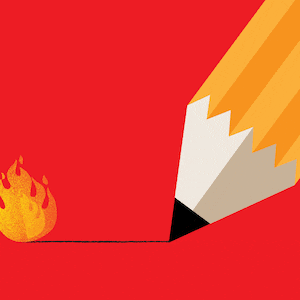Since the start of May, the hottest spot for celebrity sightings has been the Writers Guild of America’s picket line.
From star writers like Tina Fey and David Simon to A-list actors like Chris Pine, Mandy Patinkin, and Susan Sarandon, the WGA’s protests have been packed with familiar faces. Bands like Imagine Dragons and Weezer have staged concerts, and Flavor Flav was one of countless celebs who’ve turned up with pizza.
The momentum kept building this week, as SAG-AFTRA announced that both its negotiating committee and National Board had unanimously agreed to authorize a strike. While its members prepare for their own vote, SAG-AFTRA president Fran Drescher urged them in a statement to “make three a charm with an emphatic ‘yes’ for a strike authorization vote!” To do so, she wrote, would be an “unprecedented show of solidarity.”
SAG-AFTRA’s authorization—should members vote in favor—could be a pivotal inflection point for the writers strike. But what will it mean?
Dresher’s statement calls the strike a “last resort”—one that provides “maximum bargaining leverage” as SAG-AFTRA heads into talks with studios. Still, the prospect of actors walking out could hold major sway. Steven Ross, professor of history at the University of Southern California and author of Working-Class Hollywood, tells The Daily Beast that right now, “the studios can make any movie that they have a script for, that they will not change… But what if those actors say, ‘No, we’re not going to show up’? Then everything shuts down.”
“The question,” Ross adds, “is will the actors go out on strike? If they do, I think it's going to change the complexion of the strike.”
At this stage, Gerald Horne—Moores Professor of History & African American Studies, University of Houston and author of Class Struggle in Hollywood, 1930-1950—explains to The Daily Beast via email, “SAG-AFTRA authorization is critical. Ditto Teamsters and other ‘below the line’ unions.” One possible note of encouragement? General membership appears poised to vote yes, joining the other two layers of SAG-AFTRA—the National Board and negotiating committee—in approving a walkout if necessary.
“I can't remember when all three went out,” Ross said. “...Sometimes, you have a split between the National Board and the membership. But here, it looks like there’ll be a membership vote for all three to go out.”
As for Hollywood’s other unions? Members of both the Teamsters and the International Alliance of Theatrical Stage Employees (IATSE) have helped the WGA shut down multiple productions since the strike began. Meanwhile, the Directors Guild of America—known, as Variety recently described it, “as the guild that sees the studios as partners rather than as enemies”—remains a little more up in the air.
The DGA has already begun its negotiations but has not yet called a strike vote. In a column for Variety, DGA President Lesli Linka Glatter wrote, “We’re going to fight—no matter what it takes—for a strong contract that treats our members fairly and allows us to share in the success of an evolving entertainment industry.”
This week, however, Variety reported that DGA instructed dual members of both guilds (against the WGA’s instructions) that they could make minor script modifications during the strike. That seems to line up with a tweet from director and writer Boots Riley, who tweeted during the strike’s second week that the DGA had “sent a letter saying DGA members who are also WGA could still perform services that the WGA has asked us not to do during the strike.”
“I, and a bunch of other dual DGA/WGA members, have decided we won’t be taking that advice,” Riley wrote, adding later that avoiding such work “is a move of solidarity which will make the strike go faster.”
DGA is not the only union to frustrate some of its members. Last week, when Drescher showed up to support the WGA at the picket line but drew a line between their concerns and those of actors in her union, she also faced pushback. (SAG-AFTRA and representatives for Drescher did not immediately respond to The Daily Beast’s request for comment.)
And yet, to borrow a word from Drescher, something about this moment does feel unprecedented—or, at least, powerful. Streaming has upended the entertainment industry, destroying residuals (among other things) and flooding our screens with a glut of content created by workers whose bosses’ salaries, they say, are roughly equivalent to what they’re requesting collectively.
Maybe that’s why memes have begun to spring up on social media about the possibility of a united trifecta—SAG-AFTRA, the WGA, and the DGA. (And yes, at least one of them involves Succession.)
Meanwhile, the strike’s effects have already been palpable. From MTV’s starless Movie & TV Awards, to the slightly off-kilter upfronts, to the upcoming Tony Awards—which reportedly struck an agreement with the WGA to proceed without any scripted material—the absences of both writers and their allies speak for themselves. (Representatives for the Tony Awards did not respond to The Daily Beast’s request for comment.)
But what would happen if SAG-AFTRA authorized a walkout? “I would expect intense litigation by the ‘studios,” Horne wrote, and “perhaps even a ‘lockout.’” In 1946, after a protracted and bloody battle, major studios locked members of the now-defunct Conference of Studio Unions (CSU) off their sets—effectively scraping those workers and their allies off their payrolls.
Meanwhile, Horne added, “I would expect the unions to respond by extending their reach. How so? Pitching their battle as a struggle for all those whose livelihood will be threatened not only by AI but by enhanced employer power.” (Think: lawyers, accountants, and writers outside the entertainment industry.)
“Part of the goal would be winning public support,” Horne wrote, “not an easy objective to reach in a nation where—of late—unions have been on the defensive, often demonized.”
While Ross suspects the WGA’s strike will go on for months barring SAG-AFTRA’s participation, a walkout from the actors union could change things. Looking back on that same bloody period as Horne, Ross recalled that SAG-AFTRA’s alliance with the IATSE over the CSU was a crucial step toward the latter group’s demise. “Of the three groups,” he said, referring to the WGA, DGA, and SAG-AFTRA, “I think the actors are by far the most powerful.”
Beyond Hollywood, Ross added, the current writers strike is a pivotal moment for the broader labor movement. “This is not just about the movie industry,” he said. “This is also about the future of labor-capital relations, and how they are going to go.”








